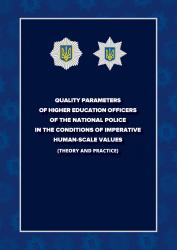Theories of leadership: personnel work as a mechanism for the protection of rights and freedoms in the activities of law enforcement officers
Keywords:
communicative competence, National Police of Ukraine, human rights and freedoms, ethical principles, interaction, personnel policy, convention, rules (codes) of ethical behavior, psychological contact, reform, humanity, police deontology, leader, law enforcement system, courage, police ethics, leadership, law enforcement agencies, honesty, corruption, self-organization, law and order, responsibility, child protection, self-development, professional identity, justice, minor, narrative professional ethics, legal and psychological foundations official activities, respect, traumatic events events, trust, professional activity, moral behavior, stress, police, service training, legal basis of professional ethics, child-friendly room, National Police of Ukraine, professional training of a police officer, ethical principles, psychological safety g compliance, personnel policy, professional selection, rules (codes) of ethical behavior, resilience, reform, training of police officers, police deontology, psychological resources, law enforcement system, professionalization of law enforcement officers, police ethics, education, law enforcement agencies, personality of a police officer, corruption, EU educational policy, law and order, value experience, child protection, education applicant, professional identity, competence, minor, transformational learning, legal and psychological foundations official activities, communicative competence, traumatic events events, forms and methods of education, professional activity, interaction, stress, education quality, service training, psychological contact, child-friendly room, assessment, professional training of a police officer, leader, psychological safety g compliance, police performance assessment, professional selection, leadership, resilience, departmental assessment, training of police officers, self-organization, psychological resources, assessment procedure, professionalization of law enforcement officers, self-development, education, work program of the academic discipline, personality of a police officer, narrative professional ethics, EU educational policy, assessment methods, value experience, moral behavior, education applicant, criterion analysis, competence, legal basis of professional ethics, transformational learning, assessment criteria, forms and methods of education, learning outcomes, education quality, behavioral diagnostics, assessment, workshop, police performance assessment, psychological training, departmental assessment, psycho-pedagogical support, assessment procedure, pedagogical skills, work program of the academic discipline, pedagogical skills of a higher school teacher, assessment methods, advanced training of scientific and pedagogical personnel, criterion analysis, assessment criteria, learning outcomes, behavioral diagnostics, workshop, psychological training, psycho-pedagogical support, pedagogical skills, pedagogical skills of a higher school teacher, advanced training of scientific and pedagogical personnelAbstract
Chapter 3 proves that the effective fulfillment by the National Police of the tasks of ensuring human rights and freedoms to a certain extent depends on the proper legal regulation of this activity through laws and other regulations. Attention is focused on the fact that, at the same time, the emphasis on the propaedeutics of professional deformation exacerbates the need to develop integral mechanisms that determine the constructiveness of this process in the aspect of the integral theory of leadership. The mechanisms of organizational and legal support of human rights and freedoms are classified into groups; It has been proved that the practice-oriented mechanism for ensuring human rights and freedoms by the National Police of Ukraine is the only, integral and qualitatively independent phenomenon of the legal system, a set of interrelated and interacting prerequisites, means and conditions that create appropriate legal and factual opportunities for the full implementation of law and freedom. It was found that the trends in reforming the system of the Ministry of Internal Affairs of Ukraine indicate the priority of the human factor over the improvement of the structure and technical modernization. After all, first of all, in order to increase the authority of the National Police among the population, in relations with citizens, it is the police officer who must act as a defender of its people and a representative of law and power, while the very specifics of personnel work should be considered as a sphere of a special “human dimension” of the organization.

QUALITY PARAMETERS OF HIGHER EDUCATION OFFICERS OF THE NATIONAL POLICE IN THE CONDITIONS OF IMPERATIVE HUMAN-SCALE VALUES
Downloads
Pages
Published
Categories
License

This work is licensed under a Creative Commons Attribution-NonCommercial-NoDerivatives 4.0 International License.

